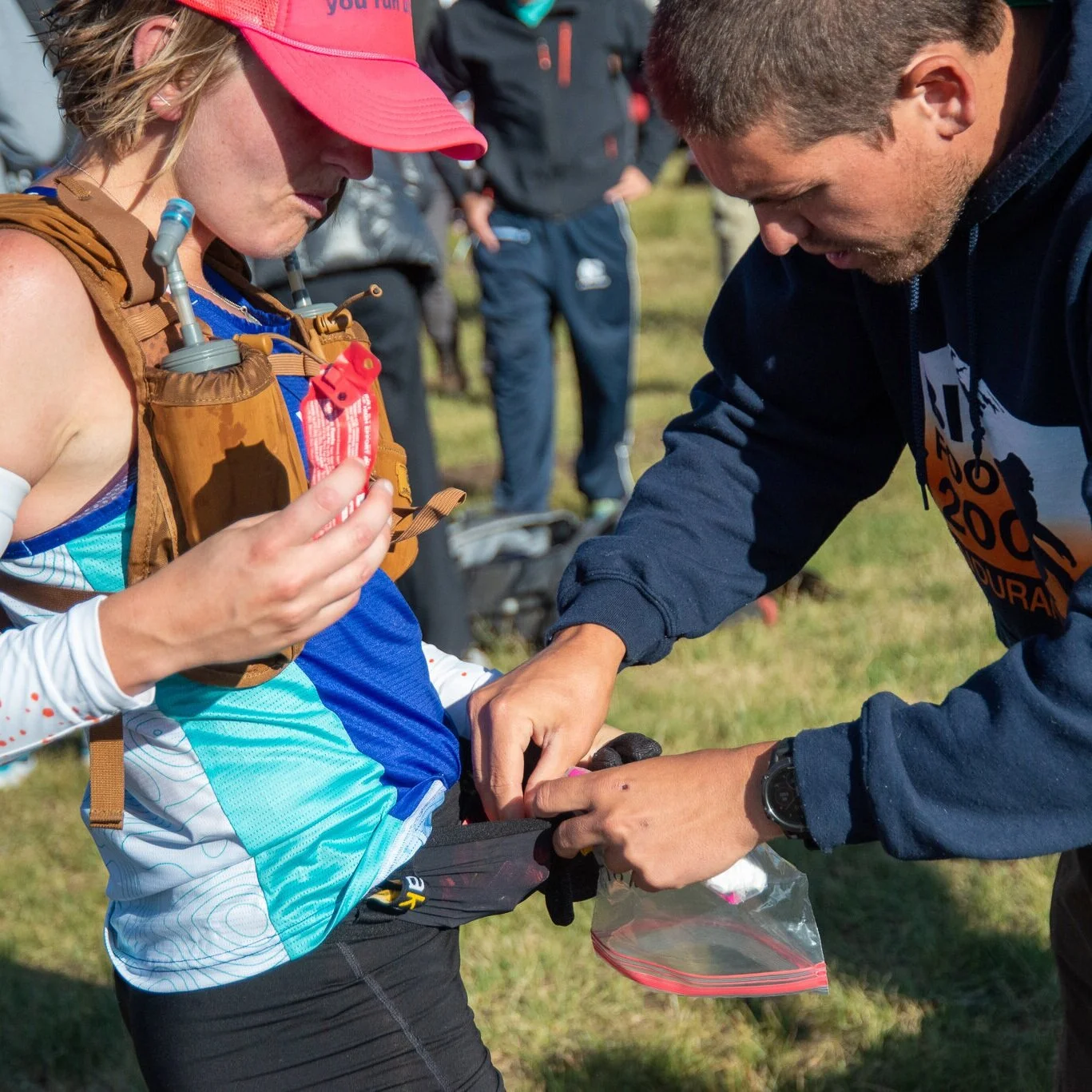How to Join the Dream Team: Tips for Pacing and Crewing an Ultra Marathon
Any ultra runner could tell you that they are only half as strong as their pacers and crew. Pacers tend to bring the strength and positive energy, pushing weary runners through the emotional and actual peaks and valleys of the race. They remind their athlete to eat, drink, pee, and keep forward movement to stay on pace, all while staying upbeat and ignoring their own ailments.
While the pacers are more “boots on ground” the crew is like a special-ops team driving through the night, lugging heavy bags full of things the runner may, or may not, want; while discussing every bodily function of the runner in order to keep them healthy and functioning. The unofficial acronym of CREW is Cranky Runners, Endless Waiting-which while pessimistic, is at least half true. There is a lot going down on the trail, and at most ultras, the crew has absolutely no real guess at to how long a runner could be out at any given section. So they sit, wait, reorganize, wait, eat, take photos, wait, and finally spring into action to change disgusting shoes, refill packs, and wipe tears.
It takes time to hone in one’s skills to be a supporting member of an Ultra Marathon runner’s team, and often the strongest pacers and crew are athletes themselves, making them better able to anticipate the needs of the runner.
BE FLEXIBLE, CARRY A BIG PACK
Your runner might have presented you with the perfect plan; they swore that they would be running a certain pace, that they would want certain food, they assured you that they would have everything under control. Then the plan hit the fan. According to ultra runner and pacer extraordinaire, Bret Naber, “Don’t get too comfortable with the plan, things change and you need to be prepared. Maybe you thought you wouldn’t be running at night, now you are. Maybe it was 75 degrees an hour ago, now it is cold and windy. Maybe your runner needs more calories, what do you have in your pack?” Bret took Lifelong Endurance coach, Kaitlyn Morgan up and over Hope Pass at the Leadville Trail 100, pushing her to eat and keep moving forward.
Keeping extra layers, snacks, water, and a headlamp (even if you had no intention of running at night) in your pack is not only helpful, but could be crucial if things slow down and your runner begins to tank. Plan for the worst case and hope for the best.
KEEP YOUR RUNNER MOVING FORWARD THROUGH THE DARKNESS
This is both literal and figurative. Things will get bleak. No matter how assertive and experienced your runner may be, blood is going to slow going to their their stomach and their brain is going to give in to fatigue; they are not going to have the best sense of what is right for them. According to Lifelong Endurance’s head coach, Andrew Simmons, “you’re the one getting them to move faster and motivate them to get to the finish. Some ultras are well marked and others are minimal. You have to be willing to literally give the shirt off your back for your athlete so they can move forward.”
As well as on the trail, it is important to keep the runner from wasting too much time at aid stations. Coach Andrew continues, “Keep in-chair time to a minimum. 12 stops at 5:00 a piece is a full hour of time lost. Set a
timer and be strict – this will minimize the time athletes have to contemplate making the aid station a final resting place.”
As a crew member, it is invaluable to be efficient and diligent while organizing your runner and preparing to send them back on to the trail. Coach Kaitlyn echoes, “check your runners pack before they leave an aid station!!!! ALWAYS they may not be 100% aware of their surroundings and their mind may just to be moving forward. Help them stay on the goal by packing their pack and keeping them fueled and their packs and bottles full.”
KNOW YOUR RUNNER
Running ultras is not easy on the body. It is understandable that the runner might not feel great and get a little disoriented. However, it is extremely important that you are aware of drastic changes. Lifelong Endurance head coach, Katie Whidden explains, “I pace each athlete differently. If it is an experienced athlete I will let them set the pace since they know their body and heart rate zones well enough to keep that in check. If they are a newer runner I am happy to set the pace. I am constantly monitoring their energy levels and mental state and adjusting accordingly. I might even suggest they slow down if they seem to be breathing too heavily or getting delusional.”
Do not be afraid to keep a cell phone or a GPS tracker for communication in your pack, especially if you do not know the athlete you are pacing super well and you need to check in with the crew. If you are pacing the runner, let the crew know of any big changes in functioning and awareness at the next aid station, even if the runner seems like they are fine overall.
BALANCE POSITIVITY AND TOUGH LOVE
There are a lot of emotions the runner will experience during the race, and they will be counting on the pacers and crew to balance them out. A little bit of positivity and encouragement goes a long way, as does gentle prodding. Lifelong Endurance coach, Kaitlyn Morgan, explains the importance of picking the right team, “when looking for a pacer pick a good cop and a bad cop. One that will bring some entertainment and lightheartedness to the tough spots
and one that you know will push you to complete a goal when you need fight for that goal.”
Both the “good cop/ bad cop” personas help push the athlete to reaching their full potential. When a runner is low, they need their crew and pacers to go high. Coach Andrew explains, “Waiting is the hardest part on behalf of the crew. I think the toughest part about pacing is being relentlessly positive. You’re in a place of pure empathy – if you’re with an athlete and your legs hurt, you’re tired, or whatever it might be – – you can’t complain. You simply have to push yourself forward and manage food with your athlete, make sure they’re talking positively, keep them moving forward.”
At the end of the day, your runner will appreciate all of the time, energy, and compassion you dedicated to helping them through the race. Whether or not they see the finish line, your support is irreplaceable and your athlete has unending gratitude. They will, undoubtedly, remember your kindness when the tables are turned and it is your turn to run through the night.




